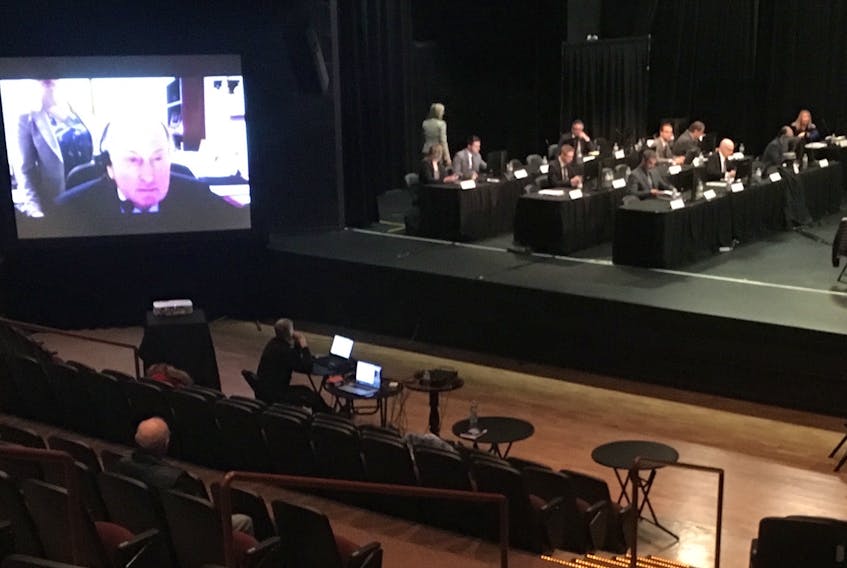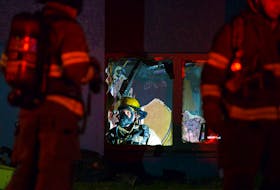HAPPY VALLEY-GOOSE BAY, N.L. — Keith Dodson works on assessing construction risks, productivity rates and costs on megaprojects all over the world. He didn’t agree with assumptions behind the early estimate for the Muskrat Falls hydroelectric project, but there was another expert opinion on the table, and the final call wasn’t his.
“We never make the choices, we only give advice,” he said, describing his role as a consultant, responding to questions Monday at the Muskrat Falls Inquiry, examining the now-blown cost estimate and schedule on the project.
The hydro project was once budgeted at just $6.2 billion, not including financing and interest costs. It is now budgeted at $10.1 billion, or $12.7 billion including financing and interest costs.
The “we” for Dodson is U.S.A.-based Westney Consulting, where he is a co-owner. The company and its owners performed work at various points along the way for Muskrat Falls proponent Nalcor Energy, including a 2010 quantitative risk assessment (QRA) and, in 2012, a look at the assumptions used in developing the project’s final cost estimate. In 2015, during construction, Westney Consulting was called back in a different role, to review construction rates and productivity, and give guidance.
Dodson’s written reports to Nalcor Energy ahead of sanctioning didn’t indicate it as clearly as he did on the stand, but he believed the project budget in 2012 was low, specifically in terms of productivity. Setting aside any amount for risks, he testified the base estimate from SNC-Lavalin — factored into his company’s review in 2012 — were not high enough, in his opinion. He said there was discussion with Nalcor Energy, which ultimately went with SNC-Lavalin’s assessment.
“The actual performance (on the project) was actually quite good,” Dodson said, crediting Astaldi Canada’s team in particular for a turnaround in productivity as construction progressed, post-2015, reaching what he considers global norms and even surpassing them at times.
But the level of productivity on that company’s contract package continued to fall short of the SNC-Lavalin estimate (and the project bid, which Dodson suggested was at first a “test of the estimate,” giving confidence).

Several representatives for SNC-Lavalin are expected to testify at the inquiry in late March (with the schedule subject to change).
Dodson said his advice is often set aside by developers, usually as a result of optimism, and sometimes over-optimism, on a project.
At the same time, he said, he was offered more foundation for the decisions being made on the Muskrat Falls project than he has received with others he’s looked at.
On Muskrat Falls, Dodson said, his company had noted a global trend since 2004 toward reduced productivity levels on megaprojects — with the work requiring more person hours than expected, ultimately costing more. But Nalcor Energy also had SNC-Lavalin, he said, with that company able to provide hard numbers from other projects it had worked on for Hydro-Québec, to support its forecasts.
“(SNC) Lavalin was very confident in their ability to do this,” he said, suggesting Nalcor took its own confidence in productivity rates from the more experienced company.
Dodson said SNC-Lavalin’s team suggested to him the company was simply doing what it had done before, in an area it was familiar with and with familiar companies expected to bid.
“As opposed to us conjecturing as to what the productivity rate was, hard data was used from those (other SNC-Lavalin) projects,” Dodson said, adding that the hard data appealed to the Nalcor Energy team.
“I couldn’t say that it wasn’t correct,” he said of the approach.
Dodson’s name came up in the first phase of the inquiry, focused on events leading up to the project’s sanctioning in 2012. Westney Consulting had suggested more should be included in the budget for “strategic risks.” Strategic risks are about unknowns, on accounting for what the project team could not reasonably foresee and account for up front.
But Dodson said it is up to clients whether or not to include these amounts in the budget. He also referenced the “semi-public” nature of the Muskrat Falls project.
The inquiry has already heard from Dodson’s partner and company namesake, Richard Westney. In his testimony, Westney said Dodson had suggested to him more be in the budget (that it should be assessed on a probability factor, P Factor, of as much as a P90, not a P50), but his suggestion was not accepted by Nalcor.
Nalcor Energy project manager Paul Harrington testified he didn’t recall a recommendation for a P90-level confidence level. Harrington questioned why it wouldn’t have been in Westney Consulting’s written report, where there was reference instead to risk exposure at anywhere from P25 to P75.
Dodson said Harrington was given his opinion verbally, as a personal thought of Dodson’s, “given the nature of the project,” but he can’t speak to what Harrington heard or didn’t hear, although he swears it was mentioned more than once.
“He was focused on the validity of the estimate,” Dodson said, while describing the exchanges.
Dodson testified at the inquiry on Monday by teleconference from his company’s main office in Houston, Texas. While there were technical difficulties during the testimony, he finished as scheduled.
Guy Holborn, from the University of Western Ontario’s Ivey Business School, was called to testify in the afternoon.
Twitter: @TeleFitz
RELATED









